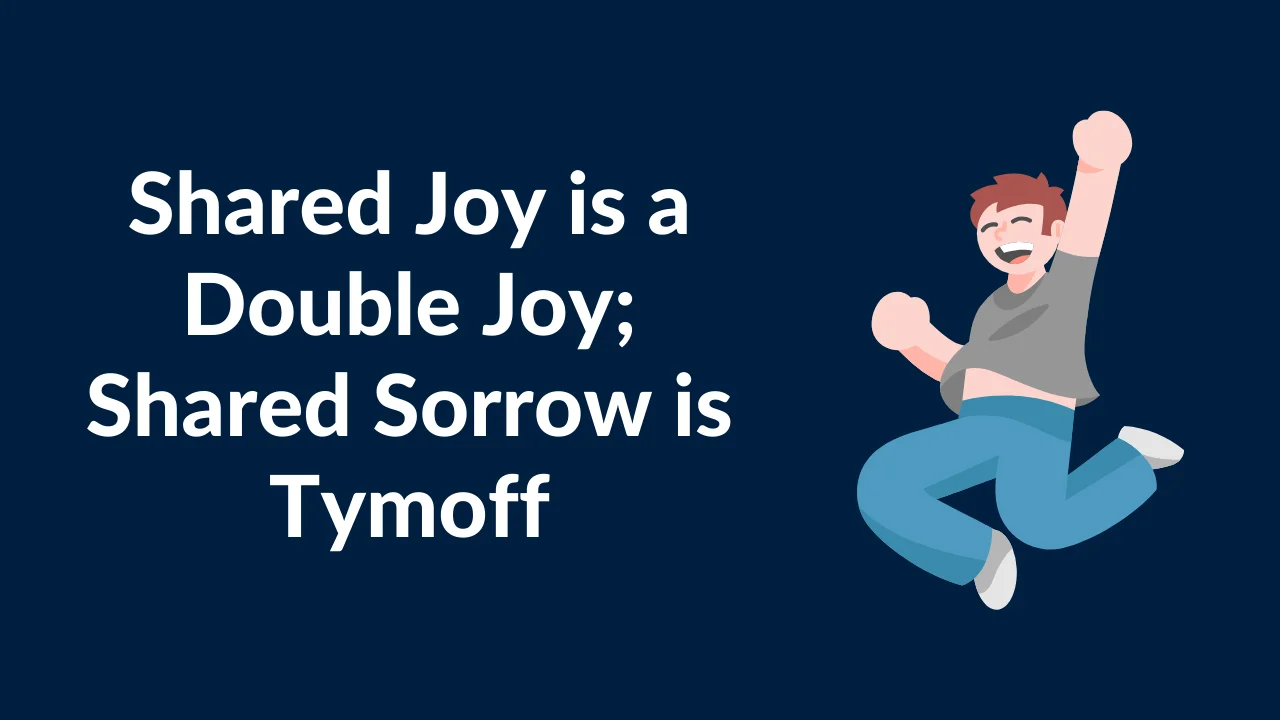Shared Joy is a Double Joy; Shared Sorrow is Tymoff

The phrase “shared joy is a double joy; shared sorrow is tymoff” encapsulates the profound impact of sharing our emotions with others. It reflects the idea that happiness is amplified when shared, while sorrow becomes more bearable. Sharing joy creates a multiplier effect. When we share our positive experiences, the happiness ripples through our social circles, fostering deeper connections and reinforcing the idea that happiness is indeed contagious. This collective celebration not only doubles the joy but also strengthens relationships and builds lasting memories.
On the other hand, “shared sorrow is tymoff” highlights the importance of empathy and communal support in times of hardship. Sharing sorrow can significantly alleviate emotional burdens. This process fosters empathy and understanding, allowing individuals to feel less isolated in their grief. The term “tymoff” signifies the transformative power of shared sorrow, where the collective support can lighten the emotional load, providing a sense of solidarity and compassion. This shared experience often becomes a cornerstone for emotional resilience and healing.
Both shared joy and sorrow play crucial roles in our emotional well-being. They emphasize the significance of human connection and the strength found in collective experiences. By sharing our highs and lows, we enrich our lives and create a support system that is invaluable during both the best and worst times.
What Does “Shared Joy is a Double Joy; Shared Sorrow is Tymoff” Mean?
The Multiplier Effect of Shared Joy
When we share our happiness with others, it has a unique way of spreading. Imagine the joy of getting a promotion or celebrating a birthday. When these moments are shared with loved ones, the happiness experienced is not just your own but multiplied among all those who share in your joy. This collective celebration not only enhances your happiness but also strengthens the bonds with those around you.
The Concept of Tymoff in Shared Sorrow
Tymoff, in this context, refers to the relief and transformation that occurs when sorrow is shared. When someone experiences a personal loss or hardship, sharing this burden with others who care can significantly lighten the emotional load. This communal sharing fosters a sense of empathy and understanding, making the sorrow more bearable and less isolating.
Empathy and Communal Support
Empathy plays a crucial role in shared sorrow. When we empathize with others’ pain, we create a support system that helps them navigate through their grief. This communal support not only provides emotional relief but also fosters a sense of solidarity and compassion among individuals, strengthening social bonds.
Emotional Resilience Through Shared Experiences
Sharing both joy and sorrow helps build emotional resilience. By experiencing life’s highs and lows together, individuals develop a stronger emotional foundation. This resilience is essential for coping with future challenges and contributes to overall well-being.
The Importance of Human Connection
At the heart of sharing emotions is the human connection. Building strong relationships through shared experiences enriches our lives, providing a sense of belonging and security. These connections are vital for our mental and emotional health, making life’s journey more fulfilling and meaningful.
How Does Sharing Joy Amplify Happiness?
Creating Lasting Memories
When we share joyous moments with others, we create lasting memories. These shared experiences become stories that we reminisce about, reinforcing the happiness we felt and the connections we made. Celebrations like weddings, graduations, and holidays are prime examples of how shared joy leaves a lasting impact on our lives.
Strengthening Relationships
Sharing happiness strengthens relationships. When we celebrate with others, we deepen our bonds and build trust. This mutual joy fosters a sense of camaraderie and appreciation, making our relationships more robust and enduring.
Enhancing Social Circles
The act of sharing joy can also expand our social circles. Celebratory events often bring together people from different walks of life, creating opportunities for new friendships and connections. This expansion of social networks can lead to a more enriched and supportive community.
Boosting Mental Health
Sharing positive experiences has a significant impact on mental health. It can reduce stress, increase feelings of well-being, and even boost the immune system. The act of celebrating with others releases endorphins and other feel-good hormones, contributing to overall happiness and health.
Creating a Positive Ripple Effect
The happiness we share doesn’t just stop with us. It creates a ripple effect, spreading positivity to others. This chain reaction of joy can uplift entire communities, fostering an environment of support and encouragement.
Why is Shared Sorrow Lessened?
Alleviating Emotional Burden
When we share our sorrow with others, the emotional burden is often alleviated. Talking about our pain and grief with those who care provides a sense of relief and understanding, making the experience less overwhelming.
Fostering Empathy and Compassion
Shared sorrow fosters empathy and compassion. When others share in our grief, they offer a listening ear and a comforting presence. This empathy helps us feel understood and less isolated in our pain.
Building Emotional Connections
Sharing sorrow can deepen emotional connections. The act of being vulnerable and expressing our deepest emotions with others can strengthen bonds and build trust. These connections are vital for emotional support and healing.
Providing a Sense of Solidarity
In times of sorrow, knowing that we are not alone can be incredibly comforting. The sense of solidarity that comes from shared sorrow provides emotional strength and resilience, helping individuals navigate through their grief.
Encouraging Emotional Healing
Sharing sorrow is a crucial step in the healing process. It allows individuals to process their emotions, receive support, and find comfort in the presence of others. This communal support plays a vital role in emotional recovery and resilience.
The Importance of Sharing Emotions with Others
Building Stronger Relationships
Sharing emotions, whether joy or sorrow, helps build stronger relationships. When we are open about our feelings, we create a deeper understanding and connection with others. This openness fosters trust and mutual respect, essential components of any strong relationship.
Enhancing Emotional Well-Being
Expressing our emotions has a positive impact on our emotional well-being. It allows us to process our feelings, reducing stress and anxiety. Sharing emotions with others also provides an outlet for emotional expression, promoting mental health.
Creating a Support System
By sharing our emotions, we create a support system that can help us through life’s challenges. This network of friends and family provides the emotional and practical support needed to navigate difficult times, enhancing our resilience.
Promoting Empathy and Understanding
When we share our emotions, we promote empathy and understanding among those around us. This empathy fosters a sense of community and solidarity, making it easier to navigate life’s ups and downs together.
Encouraging Positive Social Interactions
Sharing emotions encourages positive social interactions. It allows us to connect on a deeper level, creating meaningful and fulfilling relationships. These interactions contribute to a sense of belonging and happiness, essential for overall well-being.
Benefits of Sharing Positive Experiences
Strengthening Bonds
Sharing positive experiences strengthens bonds between individuals. Celebrating successes and happy moments together fosters a sense of unity and mutual appreciation, enhancing the quality of relationships.
Creating Positive Memories
Positive experiences shared with others create lasting memories. These memories serve as a source of joy and comfort, reinforcing the happiness felt during those moments and strengthening relationships.
Increasing Happiness
Sharing positive experiences increases happiness. When we celebrate with others, we amplify our joy and create a positive environment that uplifts everyone involved. This collective happiness contributes to overall well-being and life satisfaction.
Enhancing Social Support
Sharing positive experiences enhances social support. It builds a network of individuals who are there to celebrate our successes and provide encouragement. This support system is crucial for emotional resilience and happiness.
Fostering a Sense of Belonging
When we share positive experiences, we foster a sense of belonging. Celebrating together creates a community of individuals who share in our joy and support our achievements, enhancing our sense of belonging and connection.
How to Practice Empathy During Shared Sorrow?
Active Listening
Practicing empathy during shared sorrow involves active listening. This means giving the other person your full attention, listening without judgment, and acknowledging their feelings. Active listening shows that you care and are there to support them.
Offering Comfort and Support
Offering comfort and support is a crucial aspect of empathy. This can be through kind words, a comforting hug, or simply being there for someone in their time of need. Providing this support helps alleviate their emotional burden.
Validating Their Feelings
Empathy involves validating the other person’s feelings. Acknowledging their pain and letting them know that their feelings are valid and understood can provide immense comfort and relief.
Being Present
Being present is an essential part of practicing empathy. This means being there physically and emotionally for someone during their time of sorrow. Your presence alone can provide comfort and show that you care.
Encouraging Emotional Expression
Encouraging emotional expression is vital in shared sorrow. Allowing the person to express their feelings openly and without judgment helps them process their emotions and begin the healing process.
The Impact of Shared Joy on Relationships
Building Trust and Mutual Respect
Sharing joy builds trust and mutual respect in relationships. Celebrating together shows that you value each other’s happiness and successes, fostering a sense of trust and mutual appreciation.
Enhancing Communication
Sharing joy enhances communication in relationships. When we express our happiness and celebrate together, we create open and positive channels of communication, strengthening the relationship.
Creating a Positive Environment
Sharing joy creates a positive environment in relationships. Celebrating together fosters a sense of positivity and happiness, contributing to a supportive and encouraging relationship dynamic.
Reinforcing Emotional Bonds
The act of sharing joy reinforces emotional bonds. Celebrating successes and happy moments together deepens the connection between individuals, making the relationship stronger and more resilient.
Promoting Mutual Growth
Sharing joy promotes mutual growth in relationships. Celebrating each other’s achievements and successes fosters a sense of support and encouragement, contributing to personal and relational growth.
How Does Shared Sorrow Promote Emotional Healing?
Providing Emotional Relief
Sharing sorrow provides emotional relief. Talking about our pain and grief with others helps to release the emotional burden, making it easier to cope with the loss or hardship.
Fostering a Sense of Understanding
Shared sorrow fosters a sense of understanding. When others empathize with our pain, we feel understood and less isolated in our grief, which is crucial for emotional healing.
Building a Supportive Community
Sharing sorrow helps build a supportive community. This network of individuals provides the emotional support needed to navigate through grief, enhancing emotional resilience and healing.
Encouraging Emotional Expression
Encouraging emotional expression is vital for emotional healing. Sharing sorrow allows individuals to express their feelings openly, helping them process their emotions and begin the healing process.
Strengthening Emotional Resilience
Sharing sorrow strengthens emotional resilience. The support and empathy received from others help individuals build the emotional strength needed to cope with future challenges, contributing to overall well-being.
Ways to Build Emotional Resilience Through Shared Experiences
Creating a Support Network
Building a support network is essential for emotional resilience. Sharing experiences, both positive and negative, with a network of friends and family provides the support needed to navigate life’s challenges.
Engaging in Open Communication
Engaging in open communication is crucial for building emotional resilience. Sharing your thoughts and feelings openly with others fosters understanding and support, contributing to emotional well-being.
Practicing Empathy and Compassion
Practicing empathy and compassion helps build emotional resilience. By supporting others in their times of joy and sorrow, you create a network of mutual support that enhances resilience.
Participating in Group Activities
Participating in group activities can enhance emotional resilience. These activities provide opportunities to share experiences and build connections with others, fostering a sense of community and support.
Fostering Positive Relationships
Fostering positive relationships is key to emotional resilience. Sharing experiences with supportive and understanding individuals strengthens these relationships, providing a foundation of emotional support.
Also See: ACHIVR VISB on Bank Statement [All You Need to Know]
Frequently Asked Questions
What Does “Shared Joy is a Double Joy” Mean?
The phrase means that when we share our happiness with others, it amplifies the joy. Celebrating happy moments with others creates a multiplier effect, making the experience even more joyful.
How Does Shared Sorrow Lighten the Load?
Sharing sorrow with others can significantly alleviate the emotional burden. When we talk about our grief with supportive individuals, it fosters empathy and understanding, making the experience less isolating and more bearable.
Why is Human Connection Important in Emotional Well-Being?
Human connection is vital for emotional well-being because it provides a sense of belonging and support. Strong relationships built through shared experiences contribute to mental and emotional health, making life’s journey more fulfilling.
How Can We Build Emotional Resilience Through Shared Experiences?
We can build emotional resilience through shared experiences by creating a support network, engaging in open communication, practicing empathy and compassion, participating in group activities, and fostering positive relationships.
What Role Does Empathy Play in Shared Sorrow?
Empathy plays a crucial role in shared sorrow by providing emotional support and understanding. When others empathize with our pain, it creates a sense of solidarity and compassion, making the experience less isolating and more manageable.

Michael Dorrance is a seasoned tech writer with extensive expertise in a wide range of technology topics. His insights and analyses provide readers with in-depth understanding and innovative perspectives in the tech world.






